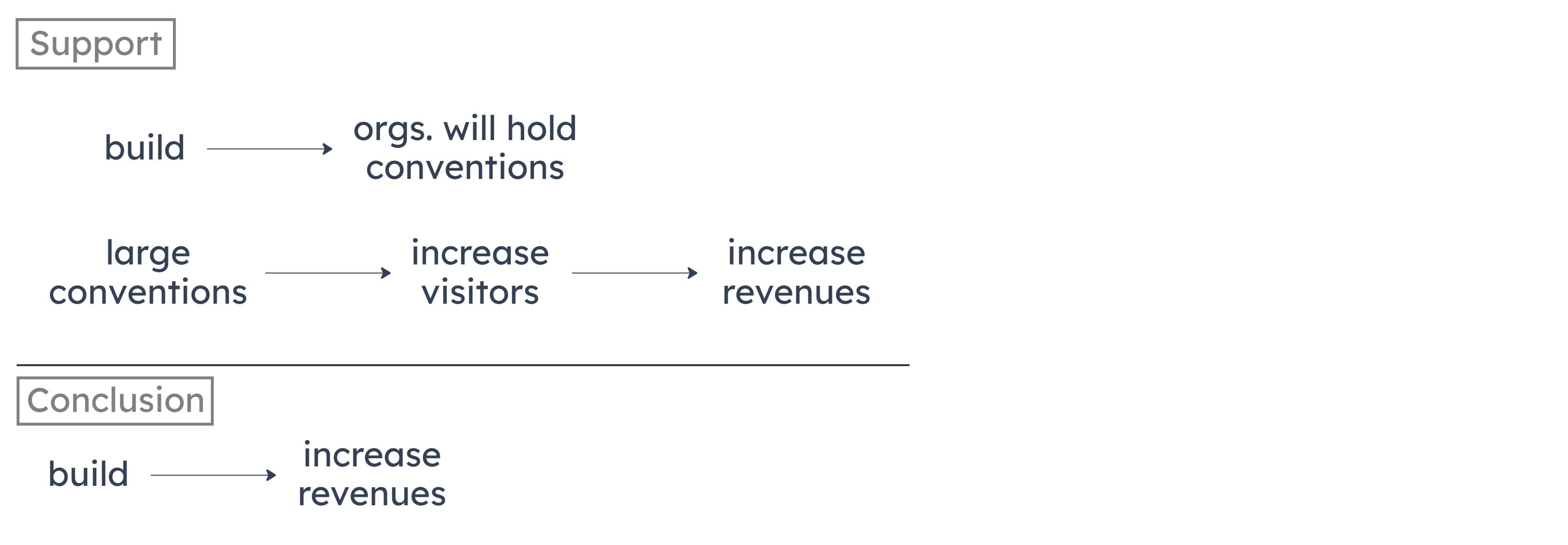LSAT 142 – Section 1 – Question 20
LSAT 142 - Section 1 - Question 20
December 2014You need a full course to see this video. Enroll now and get started in less than a minute.
Target time: 1:24
This is question data from the 7Sage LSAT Scorer. You can score your LSATs, track your results, and analyze your performance with pretty charts and vital statistics - all with a Free Account ← sign up in less than 10 seconds
| Question QuickView |
Type | Tags | Answer Choices |
Curve | Question Difficulty |
Psg/Game/S Difficulty |
Explanation |
|---|---|---|---|---|---|---|---|
| PT142 S1 Q20 |
+LR
| Sufficient assumption +SA Conditional Reasoning +CondR Link Assumption +LinkA | A
3%
155
B
21%
159
C
5%
155
D
9%
162
E
62%
166
|
152 160 167 |
+Hardest | 145.991 +SubsectionMedium |
J.Y.’s explanation
You need a full course to see this video. Enroll now and get started in less than a minute.
Summary
If the city builds the convention center, tax revenues will increase. Why? The author gives several conditional claims as support:
If the city builds the convention center, certain organizations will hold conventions there.
If large conventions are held there, the number of visitors will increase, which in turn will increase revenues.

If the city builds the convention center, certain organizations will hold conventions there.
If large conventions are held there, the number of visitors will increase, which in turn will increase revenues.

Missing Connection
There’s a break in the author’s chain of support: building the convention center means some conventions will be held there, but it’s specifically large conventions that will result in increased revenues.
The conclusion would be valid if we knew that those national professional organizations will hold large conventions.
A
If the number of visitors to the city does not increase, then the city’s tax revenues will not increase.
Contrapositive: an increase in visitors is necessary (as well as sufficient) to increase revenues. But adding a necessary condition to increase revenues can’t possibly help explain how some other condition (building the center) is sufficient to increase revenues.
B
If the number of visitors to the city increases, then the amount of money spent by visitors will increase.
The premises already say that if the number of visitors increases, tax revenues will certainly increase. (B) might explain the mechanism for that revenue increase, but it doesn’t affect the logic of the argument. We still don’t know if building the center will increase visitors.
C
The city’s tax revenues will not increase unless the convention center is built.
This says building the convention center is necessary to increase revenues, but we need to reach the conclusion that building the center is sufficient to increase revenues. (C) leaves open the possibility that building the center won’t be enough on its own to increase revenues.
D
People who are now regular visitors to the city will continue to visit the city if the new convention center is built.
What any specific visitors do is irrelevant. All that matters is whether the total number of visitors increases. And as as long as large conventions are held, the total number will increase. The problem is that we don’t know if building the center will lead to large conventions.
E
If several national professional organizations hold their conventions in the convention center, those conventions will be large.
This completes the conditional chain in the premises. Building the convention center means these organizations will hold their conventions there. Assuming those conventions are large, revenues will increase. So building the convention center means revenues will increase.


Take PrepTest
Review Results
LSAT PrepTest 142 Explanations
Section 1 - Logical Reasoning
- Question 01
- Question 02
- Question 03
- Question 04
- Question 05
- Question 06
- Question 07
- Question 08
- Question 09
- Question 10
- Question 11
- Question 12
- Question 13
- Question 14
- Question 15
- Question 16
- Question 17
- Question 18
- Question 19
- Question 20
- Question 21
- Question 22
- Question 23
- Question 24
- Question 25
Section 2 - Logical Reasoning
- Question 01
- Question 02
- Question 03
- Question 04
- Question 05
- Question 06
- Question 07
- Question 08
- Question 09
- Question 10
- Question 11
- Question 12
- Question 13
- Question 14
- Question 15
- Question 16
- Question 17
- Question 18
- Question 19
- Question 20
- Question 21
- Question 22
- Question 23
- Question 24
- Question 25
Section 3 - Reading Comprehension
- Passage 1 – Passage
- Passage 1 – Questions
- Passage 2 – Passage
- Passage 2 – Questions
- Passage 3 – Passage
- Passage 3 – Questions
- Passage 4 – Passage
- Passage 4 – Questions
Section 4 - Logical Reasoning
- Question 01
- Question 02
- Question 03
- Question 04
- Question 05
- Question 06
- Question 07
- Question 08
- Question 09
- Question 10
- Question 11
- Question 12
- Question 13
- Question 14
- Question 15
- Question 16
- Question 17
- Question 18
- Question 19
- Question 20
- Question 21
- Question 22
- Question 23
- Question 24
- Question 25
- Question 26
Leave a Reply
You must be logged in to post a comment. You can get a free account here.